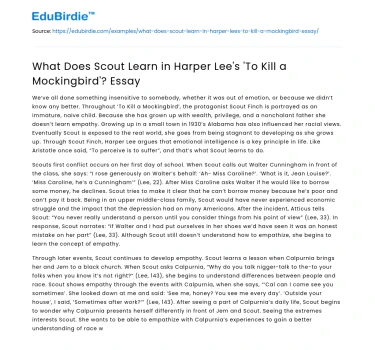We’ve all done something insensitive to somebody, whether it was out of emotion, or because we didn’t know any better. Throughout ‘To Kill a Mockingbird’, the protagonist Scout Finch is portrayed as an immature, naive child. Because she has grown up with wealth, privilege, and a nonchalant father she doesn’t learn empathy. Growing up in a small town in 1930’s Alabama has also influenced her racial views. Eventually Scout is exposed to the real world, she goes from being stagnant to developing as she grows up. Through Scout Finch, Harper Lee argues that emotional intelligence is a key principle in life. Like Aristotle once said, “To perceive is to suffer”, and that’s what Scout learns to do.
Scouts first conflict occurs on her first day of school. When Scout calls out Walter Cunningham in front of the class, she says: “I rose generously on Walter’s behalf: ‘Ah- Miss Caroline?’. ‘What is it, Jean Louise?’. ‘Miss Caroline, he’s a Cunningham’” (Lee, 22). After Miss Caroline asks Walter if he would like to borrow some money, he declines. Scout tries to make it clear that he can’t borrow money because he’s poor and can’t pay it back. Being in an upper middle-class family, Scout would have never experienced economic struggle and the impact that the depression had on many Americans. After the incident, Atticus tells Scout: “You never really understand a person until you consider things from his point of view” (Lee, 33). In response, Scout narrates: “If Walter and I had put ourselves in her shoes we’d have seen it was an honest mistake on her part” (Lee, 33). Although Scout still doesn’t understand how to empathize, she begins to learn the concept of empathy.
Save your time!
We can take care of your essay
- Proper editing and formatting
- Free revision, title page, and bibliography
- Flexible prices and money-back guarantee
Through later events, Scout continues to develop empathy. Scout learns a lesson when Calpurnia brings her and Jem to a black church. When Scout asks Calpurnia, “Why do you talk nigger-talk to the-to your folks when you know it’s not right?” (Lee, 143), she begins to understand differences between people and race. Scout shows empathy through the events with Calpurnia, when she says, “‘Cal can I come see you sometimes’. She looked down at me and said: ‘See me, honey? You see me every day’. ‘Outside your house’, I said, ‘Sometimes after work?’” (Lee, 143). After seeing a part of Calpurnia’s daily life, Scout begins to wonder why Calpurnia presents herself differently in front of Jem and Scout. Seeing the extremes interests Scout. She wants to be able to empathize with Calpurnia’s experiences to gain a better understanding of race which has been an alien concept to her.
Scout learns to perceive, and to understand others' experiences.






 Stuck on your essay?
Stuck on your essay?

